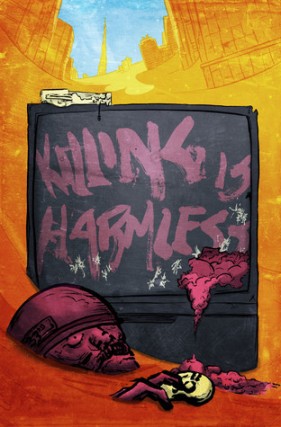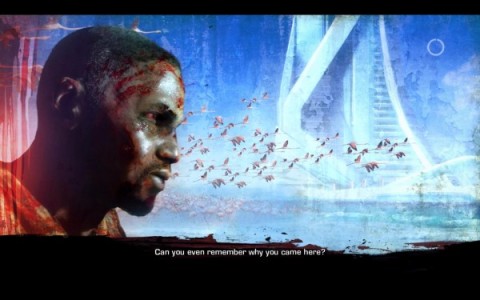back? + so i just played spec ops: the line o_o
June 23, 2013

Killing is Harmless: A Critical Reading of Spec Ops: The Line (by Brendan Keogh (Author), Daniel Purvis (Illustrator), Rob Zacny (Photographer), Benjamin Abraham (Photographer))
thwump.
That’s the noise of me crossing the finish line on what has been an exciting yet exhausting sprint since the beginning of this year. Now that things are getting closer to a more normal pace, I’d like to try to pick up something I stopped doing months and months ago — write for funsies (in public [!!!]).
Another New York-based writer and community manager writes daily and tries to keep this writing streak alive as long as possible, in the midst of a busy, busy schedule. Sure I may only write a hundred words a day, and the conclusions — if any — won’t be very profound, but some saying goes that writing for all work and no play makes you a dull person. So here’s to preventing that and talking more about games. All the better if you have fun reading with me as well.
[[Watch out below though this one’s pretty spoilerific if you haven’t played BioShock Infinite or Spec Ops: The Line.]]
Having beat BioShock Infinite and Spec Ops: The Line, I’ve already played more shooters than I usual do in one year, definitely more than I usually play in six months. I’ve just never had the stomach for them or killing many very realistic humans en masse. Even the ones I have played (the original BioShock), I usually have to pause mid-mission to clear my head. I can’t play in hours-log stretches easily, so this often makes for slow-going.
The very ambitious BioShock Infinite felt very much like, yeah, another shooter (kill, smash, etc., is everything dead now? ok cool i win), right until the end, where it drops an overwhelming bulk of information revealing the how and why of what becomes a very thoughtful and tragic story. Since the disc is still in the PS3 (everything since has been downloaded from PSN), I occasionally think back to the plot every now and then, especially the Luteces. I’m still awed by how it connects to the original. However, this time, I’ll end up rambling mostly about Spec Ops.
I more recently finished Spec Ops: The Line, and know it will stick with me for a long time yet. It’s everything I hate and love about what can be done with shooters. I hate games where you brainlessly mow down wave after wave of generic, armored enemies because hey, it’s a shooter and that’s what you do. I love games where you’re made to consider your actions, and the inevitable atrocities your character commits. (I mean, you can technically you can skip that horrifying white phosphorus scene … by not playing the game any further).
I won’t soon forget the double-take I had at the loading screens. Some lines are just gameplay tips and others I can brush off (“If you were a better person, you wouldn’t be here.” — duh, I’m playing a videogame where I kill everything in sight till I reach the end), but toward the end, my reaction became more: Read, blink, blink, hurriedly re-read the sentence, feel awash in revulsion, gingerly pick up controller again, play more. Sometimes I would just sit on the couch for a couple seconds in disbelief. “Do you feel like a hero yet?” Never. “How many Americans have you killed today?” Too many. “You are still a good person.” Nope. Nope. Nope. Quit lying to me, videogame, quit lying to me. “Do you even remember why you came here?” Oh yeah… something about a rescue mission? Urgh.
This one spurred the most immediate revulsion: “If Lugo were still alive he’d likely suffer from PTSD. So really, he’s the lucky one.” (I mean, whoa. Way to bring a big issue into my living room. No sarcasm here — I greatly admire Yager for doing this so effectively. Reading through some Internet posts, it seems to have affected lots of people, and I was definitely one of them. I had to sit back on my couch after this and think for a while to absorb it).
Players get plenty of chances to walk away. Walker’s deterioration is evident from a long way off (Finding out it’s largely hallucinated is less apparent — seriously, can you believe that soldier-civilian choice with the snipers ISN’T REAL?!). I could see he was drawing closer to that heart of darkness, but kept playing anyway. I was terrified, but couldn’t wait to play more and see where it led. Personally, I wanted to see how far I could go in this really twisted world. I feel a little self-disgust when I think this but know it to be true.
Not that we need every shooter to be exactly like Spec Ops: The Line. But it’s a very interesting start into injecting a little more morality, thought, and compassion into the genre. That’s something I’d like to see, and even though Spec Ops: The Line was horrific, it was far more palatable than most shooting games in that it admitted you were committing all these atrocities and that you would not be forgiven for them or even be able to come to terms with them.
Much like when I wrapped up BioShock Infinite, I’ve spent the past day or so scouring the internet for critical reviews and other articles on Spec Ops: The Line, to make sure I’m viewing it from every possible perspective. Feel free to leave me your favorite Spec Ops write-up in the comments. Sometime this week I hope to read “Killing is Harmless: A Critical Reading of Spec Ops: The Line,” which I scooped up in the amazing videogame StoryBundle.
Now playing: Knytt Underground, Final Fantasy VI
今日何を読んだ?:Nintendo Working on Free-to-Play Games?
(my small effort to maintain the limited Japanese skills I have by making sure I read one thing daily in Japanese, even if it’s with heavy support from Rikai-kun)
